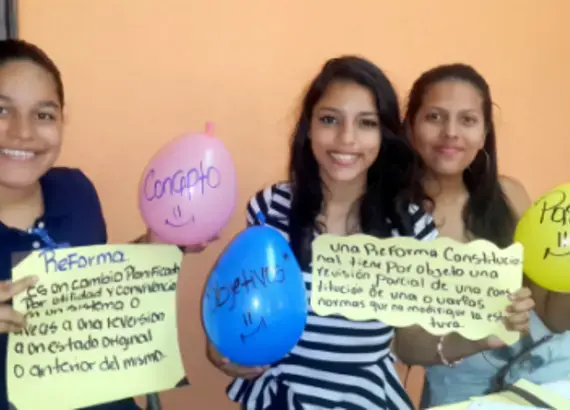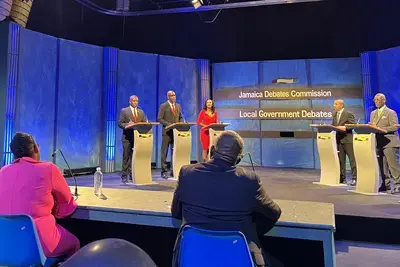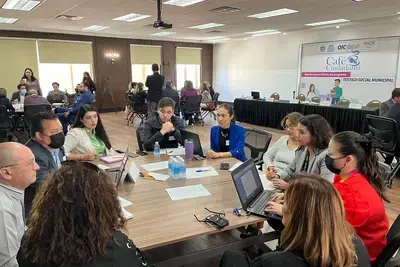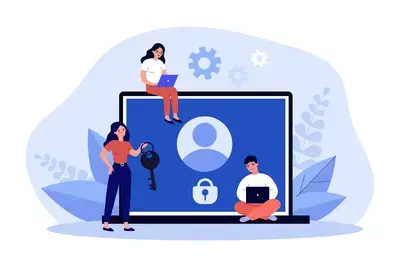
Success Story
Youth Dialogues Engage the Next Generation of Leaders in Nicaragua
While youth in Nicaragua make up one quarter of the country’s population, the next generation of leaders faces significant barriers to getting involved in their country’s political process.
In 2014, reforms to the Nicaraguan Constitution increased the authority of the president and limited the ability of citizens, including young people, to get involved in the political process.
At the time, national public opinion polls indicated that 70 percent of Nicaraguans were unaware of the reforms, and those who were aware were unable to identify the specific changes. The reforms removed presidential term limits, granted presidential decrees the authority of law and eliminated vote thresholds, thereby making it possible for the president to be elected even with very low voter turnout.
From February through June this year, NDI and three local partners launched a series of youth dialogue initiatives, called dialogos ciudadanos, which were seminars aimed at engaging young people in critical thinking about how the constitutional reforms affect their daily lives. The three local partners represent different sectors of Nicaraguan society: Caritas, a faith-based organization; Meeting Points (Puntos de Encuentro), a women’s rights organization; and the Nicaraguan Institute for Development (El Instituto Nicaragüense de Desarrollo), an organization that promotes responsible and innovative entrepreneurship.
Over the course of the four month program, NDI and its partners held 91 dialogues, involving more than 2,250 participants. Each dialogue hosted 20 to 30 youth participants. The dialogues helped young people understand why participation is important. At the start of each dialogue, the participants shared their expectations and collectively developed dialogue rules that promote respect for diverse opinions. The act of developing their own rules set the stage for thinking about how the constitutional reforms have affected participation in society.
Participants then sharpened their critical thinking and communications skills through group presentations, team-building games, short skits and individual reflection. Meanwhile, instructors led discussions on a variety of governance and democracy issues, including citizenship, rule of law, constitutionalism and recent reforms to the constitution, among others. With the knowledge and analytical skills acquired at the dialogues, young participants analyzed how political issues affect their lives, families and their surrounding environments.
Surveys conducted before and after the dialogues show that the sessions helped to inform young people about the constitution and reforms, and increased their interest in how public policy affects their daily lives. Commenting on the benefits of attending a dialogue, one participant explained: “I learned about the Constitutional Reforms of 2014 and how to work as a leader in my community.”
Beyond the crucial first step of motivating youth to think critically, the dialogues program also encouraged youth to take on leadership positions in their communities. At the end of each dialogue, participants pledged to talk about the constitutional reforms with their families and peers and look for ways to promote citizen participation and civil rights. Subsequently, 75 percent of respondents in a follow-up survey said they have upheld their pledges.
The dialogues are part of a larger campaign facilitated by NDI and its partners to engage youth in Nicaragua’s political process. Other campaign activities include a weekly partner-run radio program, television programming, a series of university debates, a "youth creative expo" that encouraged student to express abstract political concepts and connect them to daily life, and an active social media presence. The campaign has developed an online following, including a Facebook page with more than 4,500 likes, a Twitter handle, a YouTube channel and the Dialogo Ciudadano website.
NDI’s program in Nicaragua is implemented through the support of USAID’s Mission in Nicaragua.
On International Youth Day (Aug. 12) at 10 a.m. ET, NDI will host a Twitter discussion on how political parties can boost youth political participation. Find out how to join the conversation: /tweet-talk-youth-participation
To learn more about NDI’s youth programs, click here
Read more:
Published on August 10, 2015



